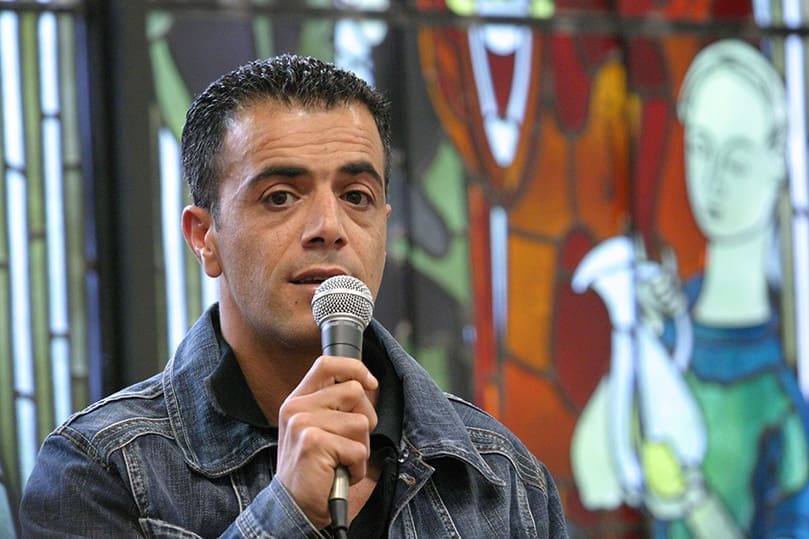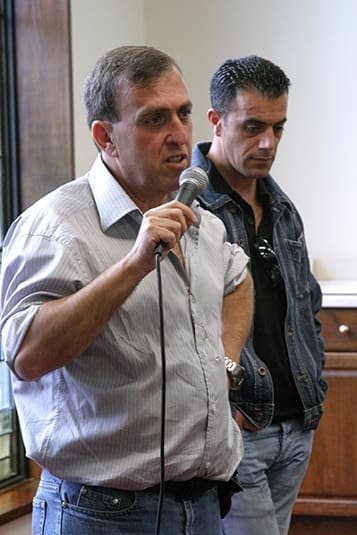 Photo By Michael Alexander
Photo By Michael AlexanderAtlanta
After Tragedy, Holy Land Speakers Pursue Peace
By ANDREW NELSON, Staff Writer | Published May 8, 2008
As young men, the two could not have been more different: a battle-hardened former Israeli soldier, a rock-throwing Palestinian jailed for protesting the occupation of the West Bank.
But through shared sorrows, Mazen Faraj and Rami Elhanan now call each other brothers.
“We are not competing with the size of our pain. We do not blame each other. We are showing the way out,” said Elhanan.
In fact, it is their heart-wrenching pain that fuels their efforts toward peace as members of Parents Circle-Families Forum, where 500 families in both Israel and the West Bank work to end the spiral of violence between the two societies.
“We have an enormous ally on our side. We have the power of pain. You should know that pain has the characteristics of nuclear energy. And like nuclear energy, you can use pain to bring dominance and destruction and pain. And you can use it to bring light. And we use our pain … in order to get through to people. And to show them we can call each other brothers,” said Elhanan, who casually tucked his glasses into the front of his blue button-down shirt.
It is a complicated story. Neither of the two uses words like forgiveness as Catholics understand it; they feel it is tied to forgetting the past. The decision to engage in dialogue and not vengeance remains a daily obligation. But both are convinced that bloodletting in the Holy Land won’t stop until the societies see the humanity in each other.
“We are not doomed. This is not our destiny to keep on killing and dying in this Holy Land of ours. We can change it. We can break once and for all this endless cycle of violence, of revenge, of retaliation. And this is to talk to each other,” Elhanan said.

Seated with her husband Joe, Velma Cerniglia is moved to tears as she hears the compelling story of Jerusalem native Rami Elhanan, one of the two men participating in the “Behold Peace In The Holy Land” tour through the southeastern United States. The tour is sponsored by Catholic Relief Services. Photo By Michael Alexander
The two men presented their stories on Monday, April 28, at Holy Spirit Church, Atlanta, in front of two dozen people as part of a tour of the United States. They were brought here by Catholic Relief Services, which works in Israel and the West Bank providing humanitarian aid, leadership development and food. The speakers visited four other Catholic churches and the Carter Center during their visit to Atlanta.
Mazen Faraj, 32, shared his story of grief. Faraj lost his father in 2002. An Israeli soldier shot him during a siege in Bethlehem.
As a youngster, Faraj grew up in a refugee camp outside the city of Jesus’ birth. It was where his father’s family fled during the first Israeli-Arab war in 1948. As a teenager, he spent three years in jail fighting the occupation during the first intifada against Israel.
Later, he committed to a peace group overcoming initial disbelief that anyone on the Israeli side was interested in halting the violence.
“I believed in the peace way. We can do it in the dialogue way,” he said.
Then the shooting of his 62-year-old father shook his new belief. It challenged him to examine his choices. Revenge was an option, but not one he chose.
“There is something else. I start to build something new, creating a message of hope, peace. We created from our pain and suffering this message. We didn’t want to be any more victims in the conflict. We just want to end it,” Faraj said.
Elhanan, a 58-year-old graphic designer in Jerusalem, is the son of an Auschwitz survivor. A Palestinian detonated a bomb that killed his teenaged daughter in 1997 in downtown Jerusalem. She was 14 at the time.

Having lost loved ones to the conflict that grips their countries, Rami Elhanan, foreground, a 58-year-old Israeli graphic designer, and Mazen Faraj, a 32-year-old Palestinian have joined forces to work for peace and reconciliation between Israelis and Palestinians. Elhanan’s 14-year-old daughter was killed by a Palestinian suicide bomber and Faraj’s 62-year-old father was killed by an Israeli soldier as he carried his groceries. Photo By Michael Alexander
“You find yourself in the morgue. You see a sight that you will never ever be able to forget for the rest of your life. Then you come back home,” he said.
Everyone at that moment faces a crossroads.
“What are you going to do now with this pain which you never felt possible? What are you going to do with this anger that eats you alive from within?” he asked.
There is violence, striking out to cause pain to others to lessen one’s agony, but that never works, he said. Then there is the very complicated process to set one’s goal toward ending the violence, he said.
“There are no shortcuts. There is no other road,” he said.
For nearly a decade, the Parents Circle has been advocating for reconciliation. The families from Israel and Palestine are involved with the project. The group’s mission is to hear each other’s pain. Its members believe the first step toward peace is by talking and listening without judgment.
The unlikely duo wants people to know that the violence is stoppable. They don’t buy the argument that the killing is an endless cycle that dates back hundreds of years. They believe that the United States can bring together the warring factions and force the peace process by putting pressure on Middle East leaders.
“We bang our heads against this very high wall of hatred and fear that divides our two nations today. We put cracks of hope in this wall. Our blood is the same color. Our pain is exactly the same pain. And our tears are just as bitter. And if we who paid the highest price, if we can talk to one another, anyone can and anyone should,” said Elhanan.
For more information visit http://crs.org/act/speaker-tour-resource.cfm or www.theparentscircle.org.